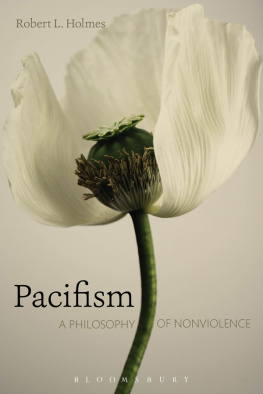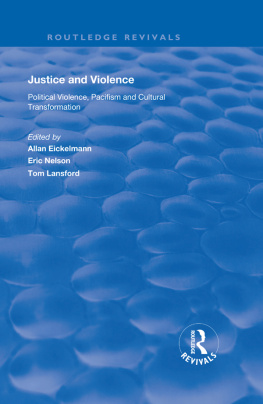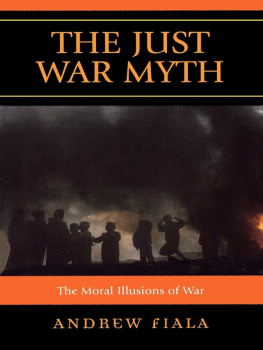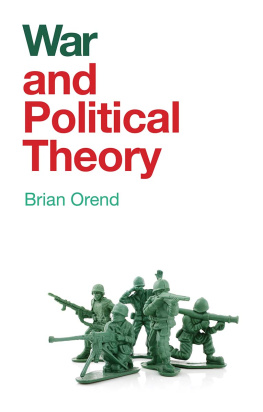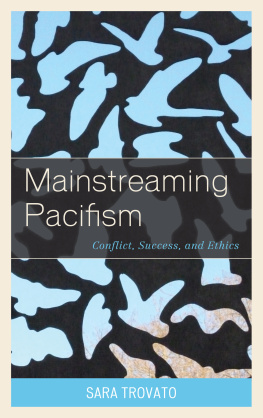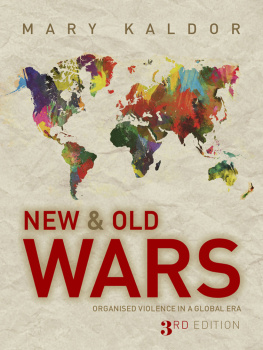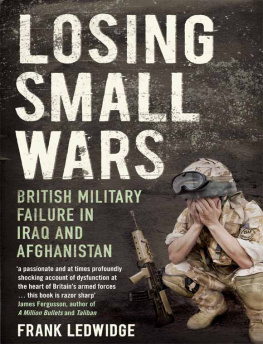Pacifism
Also available from Bloomsbury
Citizen Killings, Deane-Peter Baker
On Resistance, Howard Caygill
The Ethics of Nonviolence, Robert L. Holmes
Violence, Pamela Stewart
Pacifism
A Philosophy of Nonviolence
Robert L. Holmes
Bloomsbury Academic
An imprint of Bloomsbury Publishing Plc

For Veronica
Now it is an interesting, if obvious, fact that nobody who talks bravely about war has ever been killed in war.
A. A. Milne
Yet the dust, the thunder, the carnage, and the ruin of war seem to make visible some deeper disorder, some suicidal madness in the human race.
George Santayana
Contents
appeared in Peacework, a publication of the New England Branch of the American Friends Service Committee; The Acorn: Gandhian Review; Joseph Kunkel and Kenneth Klein (eds), issues in War and Peace, Longwood Academic, 1989; and Metaphysical Research of St. Petersburg, Russia, in 2005. Appreciation to these publishers for use of the material.
Epigraphs, in order of their appearance, are from the following:
A. A. Milne, Peace with Honor (New York: E. P. Dutton, 1934), p. 108.
George Santayana, Dominations and Powers: Reflections on Liberty, Society and Government (New York: Charles Scribners Sons, 1951), p. 439.
Rajiv Gandhi, Speech before UN special session on disarmament, June 9, 1988.
Carl von Clausewitz, On War [1832], ed. Anatol Rapoport (Baltimore, MD: Penguin Books, 1968), p. 386.
Steve Morse, unpublished essay, smorse2@charter.net.
Augustine, Letter CCXXIX (AD 429) to Darius.
James M. Lawson, Fellowship, Vol. 78, No. 46, Summer/Fall 2014, p. 26.
Steven P. Lee, Ethics and War: An Introduction (Cambridge: Cambridge University Press, 2012), p. 33.
Michael Walzer, Just and Unjust Wars (New York: Basic Books, 1977), p. 128.
Robert W. Brimlow, What about Hitler? Wrestling with Jesuss Call to Nonviolence in an Evil World (Grand Rapids, MI: Brazos Press, 2006), p. 69.
Anonymous, The New York Times, May 15, 1966.
Philip Caputo, A Rumor of War (New York: Henry Holt, 1977), p. xix.
Daniel Yergin, The Prize: The Epic Quest for Oil, Money & Power (New York: Simon & Schuster, 1991), p. 200.
William G. ONeill, Kosovo: An Unfinished Peace (Boulder, CO: Lynne Rienner, 2002), p. 54.
Hugo Grotius, The Rights of War and Peace, Book I, chapter II.
Richard Werner, Pragmatism for Pacifists, Contemporary Pragmatism, Vol. 4, No. 2, December 2007, pp. 93115.
James P. Sterba, Justice for Here and Now (Cambridge: Cambridge University Press, 1998), p. 163.
Jeff McMahan, Aggression and Punishment, in Larry May (ed.), War: Essays in Political Philosophy (Cambridge: Cambridge University Press, 2008), p. 78.
Barry Gan, Violence and Nonviolence (New York: Rowman & Littlefield, 2013), p. 48.
Jessica Stern, Terrorism in the Name of God: Why Religious Militants Kill (New York: HarperCollins, 2003), p. xxviii.
Muhammad Ali, The New York Times, June 21, 2013.
Mark Twain, Mark Twain in Eruption, ed. Bernard DeVoto (New York: Grosset & Dunlap, 1940), p. 69.
Lin Yutang, Between Tears and Laughter (New York: Blue Ribbon Books, 1945), p. 130.
I would like to express appreciation to Predrag Cicovacki, Barry Gan and Richard Werner for valued conversations over the years on many of the topics of this book, as well as for helpful comments on portions of the book itself. Most of all, I thank my wife, Veronica, for her patience, support and encouragement throughout and for reading and providing valuable comments on the entire manuscript, a true act of supererogation.
Nonviolence in international relations is the only available basis for civilized survival, for the maintenance of peace through peaceful coexistence, for a new, just, equitable and democratic world order.
Rajiv Gandhi, 1988
The most stunning international event of the last decade of the twentieth century was the collapse of the Soviet Union. In little more than a moment by historical standards, a state whose rivalry with the United States had shaped the international scene for nearly fifty years, ceased to exist, and along with it an empire forged in the name of a global Marxist ideology. This set the stage for the emergence of a new world order. What precisely that order will be remains unclear well into the twenty-first century. But how America uses its vast economic, political and military power will be a major determinant of that order. This fact does not make America exceptional in terms of entitlement or moral standing. It does, however, give it unusual potential for transformative world leadership. That potential carries with it a challenge to chart a wise and humane course through the twenty-first century. For this reason, I shall focus in will focus on topics essential to critiquing the moral underpinnings of that role. These issues center on the problem of war.
America has not, since its founding, fought a major war against a foreign power on its own soil, and it has never suffered the devastation from war that countries like Russia have. Even the destruction of the Civil War, which claimed the most casualties of any American war, was largely limited to the South.a limited understanding of the nature of war and the moral issues it raises. Much the same might be said of the understanding of peace, which is often mistakenly taken to be no more than the absence of war. Positive peace exists only when the conditions of a good life are present and sustainable. These presuppose physical survival, of course, but preoccupation with physical survival not only cannot guarantee the realization of the other conditions, it can actually obstruct their attainment. It does so in nations that squander their resources on armaments to the detriment and sometimes impoverishment of their own people. Absolute security is an illusion. It is no more attainable by a country than by individuals.
The conditions of a good life for a people include social justice, trust and respect for persons. These require cooperation, not only among members of ones own society, but also with members of other societies as well. In the end, the well-being of all peoples is interconnected. No peoples lasting security can be achieved at the expense of others. The exploitation, domination, or oppression of others eventually victimizes the victimizer as well, if only through the moral corruption it works in the oppressors national character.
We think of military power as the best guarantor of security. But the collapse of the Soviet empire reveals the fragility of power understood primarily as the capacity to inflict death and destruction. A militarized state that could have been overcome, if at all, only at a horrendous cost if confronted head-on by military might, disintegrated once the true source of its powerthe willingness of its people to continue acquiescing in the rule of a government in which they had lost confidencewas removed. That happened once people lost their fear, as they did, not only in the Soviet Union, but also in the essentially nonviolent revolutions of Eastern Europe: from the ten-year struggle of Solidarity in Poland, to the six-week inspired uprising in Czechoslovakia. Perhaps most notable was the case of Lithuania, the first of the Soviet Republics to declare its independence. Mobilizing a system of nonviolent defense against the Soviet military, volunteers from throughout the country converged on Vilnius, setting up shacks in the newly christened Independence Square, site of the parliament building, and establishing communications networks. Lithuanians responded by the thousands when called out to confront Soviet troops nonviolently when they moved against key governmental and communications centers. To be sure, the Soviets could have taken the parliament buildingthe seat of the new government and symbol of Lithuanian defiance of Moscowin a few hours had they chosen to; and had not the Soviet government collapsed when it did, the Lithuanian struggle for independence would have been a protracted one of less certain outcome. But these considerations only highlight the fact that any successful nonviolent action, like any successful military action, presupposes conditions in whose absence the action might not have succeeded. Nonviolence did not succeed in Tiananmen Square. It did in Lithuania.

